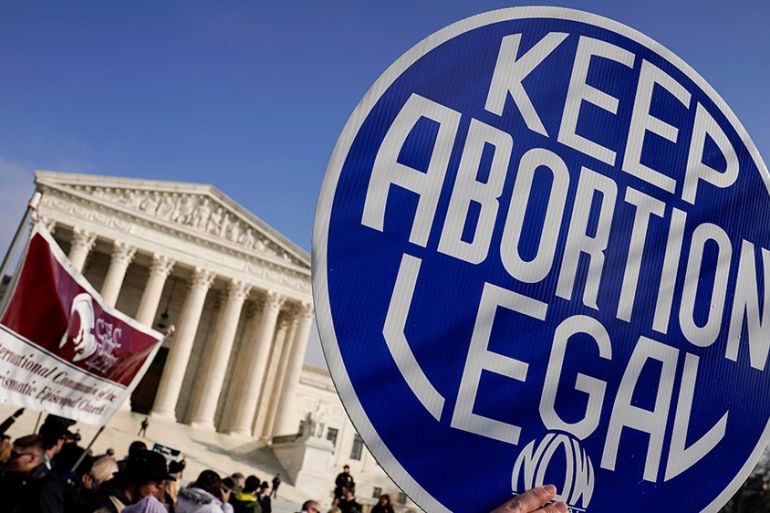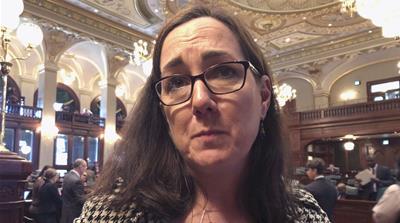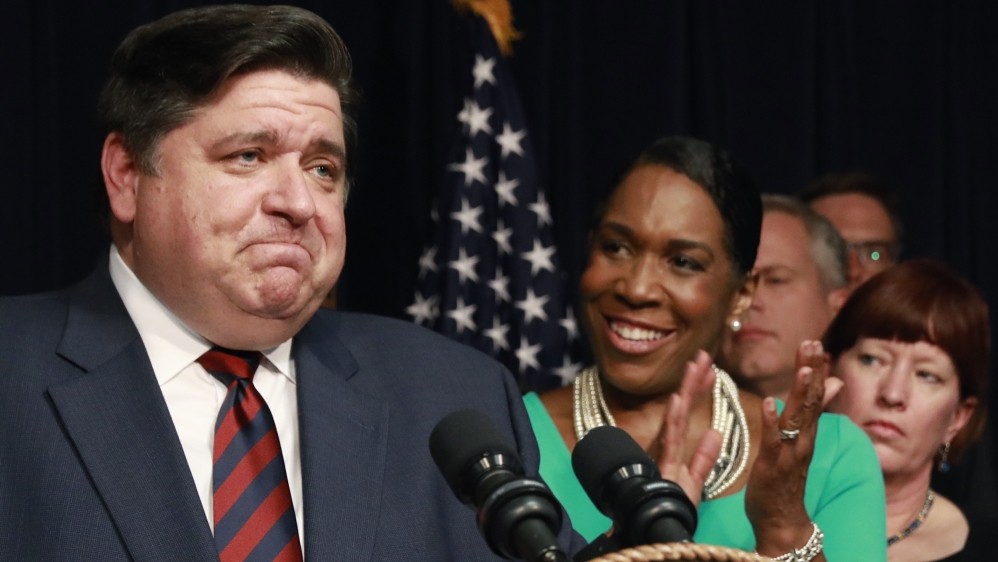In the face of new abortion bans, some US states expand access
As more states pass abortion bans, Illinois, New York and others seek to protect a woman’s right to have the procedure.

Kelly Cassidy has spent her entire career helping women access safe abortions. As an Illinois state representative in the Chicago office of the National Organization for Women, she spent her days “fielding calls from folks who could not get access to safe abortion procedures, either because of financial barriers or geographic barriers”.
She also worked as a clinic escort, “trying to help women access medical care in spite of the presence of aggressive protesters”. The mother of three has also “needed abortion care” herself.
Keep reading
list of 4 itemsTen years after Chibok girls kidnapping: One woman’s struggle to move on
Poland lawmakers take steps towards liberalising abortion laws
Polish lawmakers debate reforming strict abortion laws
So when Cassidy, now an Illinois state representative, saw legislatures across the United States pass bills that restricted or banned abortions, she felt she had to act.
Cassidy sponsored the Reproductive Health Act, a bill she calls a “firewall to protect that right here in Illinois as states around us seek to limit or eliminate it”.
The bill was signed into law on Wednesday by Illinois Governor JB Pritzker, who wrote on Twitter that it makes Illinois the “most progressive state in the nation for reproductive healthcare”. Anti-abortion rights activists called the bill a “death penalty”.
Among other provisions, the Reproductive Health Act requires that health insurance companies cover abortions and repeals previous Illinois laws that restricted abortion including the Illinois Abortion Law of 1975, the Partial-birth Abortion Ban Act, and the Abortion Performance Refusal Act.
Cassidy said she hopes the law is a beacon of hope for women who worry their constitutional right to abortion is being taken away.

“In recent weeks and months, there was this sense of hopelessness, this feeling that they’re coming for us,” Cassidy told Al Jazeera.
“I feel good that Illinois was able to push back on that and say, ‘This is not a foregone conclusion. Not everybody feels this way.’ I do hope that we offer a sense of comfort and hope and encouragement to women across the country who may be feeling pretty attacked right now.”
Cassidy is just one of several female state legislators who have led the charge to expand, broaden and protect abortion access even as many other states move to ban or restrict the procedure.

In New York, Democratic state senator Liz Krueger pushed to codify the 1973 Supreme Court Roe v Wade ruling through the Reproductive Health Act, which was signed into law in January.
In Nevada, state senator Yvanna Cancela helped pass the Trust Nevada Women Act, which was signed into law on May 31.
California, Maine, Vermont and Washington have also “either moved or enacted abortion protections” in 2019, according to Elizabeth Nash, the senior state issues manager for the Guttmacher Institute, a nonprofit reproductive health research and policy organisation.
‘Under attack’
But across the country, more than 20 anti-abortion measures have been passed in 12 states in 2019 alone, according to the Guttmacher Institute.
In May, Alabama’s governor signed the most restrictive abortion law in the country, which bans abortions in nearly all cases, including rape and incest. Arkansas, Georgia, Kentucky, Louisiana, Mississippi, Missouri, North Dakota and Ohio have all passed abortion restrictions, as well.
Anti-abortion rights groups hope legal challenges to these bans will go all the way to the Supreme Court, which has a conservative majority after the swearing-in of Justice Brett Kavanaugh in October, and help overturn the landmark Roe v Wade decision, which legalised abortions.
Pro-abortion rights groups, including Planned Parenthood, warn this would mean a return to the days of unsafe, illegal abortions.
|
|
“Let me be clear – abortion rights are under attack like never before,” said Rachel Sussman, the national director of state policy and advocacy for the Planned Parenthood Action Fund.
“With Trump in the White House and Kavanaugh on the Supreme Court, anti-abortion politicians are emboldened and they are pushing radical abortion bans in state after state. The motive behind these bans is clear – to overturn Roe vs Wade and make abortion inaccessible in this country,” she told Al Jazeera.
Without a constitutional right to abortion, women in states without abortion laws would be unable to access the procedure, or would have to travel across state lines to terminate a pregnancy.
But disparities in abortion access depending on where women live already exist because of state-level restrictions and clinic closures, Nash said.
“Abortion access is much more limited in the South, Midwest and the Plains compared to the West and the Northeast,” Nash added. “We have seen the number of abortion clinics decrease for decades. Particularly recently, in some states, the clinic closures have been the result of abortion restrictions. These states include Texas, Ohio, Tennessee, Virginia, Pennsylvania and Arizona.”
Disparities also already exist within states, Nash said.
“I think it’s important to keep in mind that we have limited access to abortion in a large part of the country and even in states that typically protect abortion rights, such as in rural areas,” she explained, adding that “one clinic in a state simply isn’t enough to maintain access.”

Missouri, which borders Illinois, now has just one operating abortion clinic. A judge in Missouri ruled on Monday that the clinic could stay open as a legal battle over the renewal of its licence plays out in court.
As a relatively liberal state located among more conservative ones, Cassidy said, women already travel to Illinois to seek abortions. More than 5,500 women came to the state to terminate pregnancies in 2017, up more than 1,000 from the previous year, the Chicago Tribune reported, citing annual state reports.
‘When, not if’
Those numbers underscore an important fact for abortion rights advocates that women with the financial means to do so will continue to be able to travel to states where they can terminate unwanted pregnancies, while those who cannot afford to do so will suffer.
Seventy-five percent of abortion patients in 2016 were poor or low-income, according to the Guttmacher Institute.
“While these bans affect all of us, we know that these bans will hit people struggling to make ends meet the hardest,” Sussman said.
|
|
“And we know in this country, discrimination – racism, homophobia, transphobia – is deeply tied to how much money you’re able to make. While some wealthy women may be able to find a way around abortion bans, far too many people – particularly people of colour, LGTBQ people, and people with low incomes – will be left with no options at all.”
While working as an advocate for women’s rights, Cassidy said she often worried what would happen if Roe v Wade were to be overturned. Now, she said it’s not a matter of if, but when.
“My whole career, I’ve talked about if Roe falls, and for the last year, I’ve been saying when, and every time I say it, it’s like a gut punch,” Cassidy said. “When Roe falls, it will go to the states to decide, and that is why I felt like it was important for us to pass the Reproductive Health Act and ensure that if nowhere else, then in Illinois, rights will be protected.”
Sussman said one in three women live in a state where abortion could be outlawed if Roe v Wade were overturned, which is why state-level protections are crucial.
“It’s not enough to fight defensively. Champions in states are recognising that they must act to ensure access to reproductive health can withstand the attacks in the years to come,” she said.
|
|